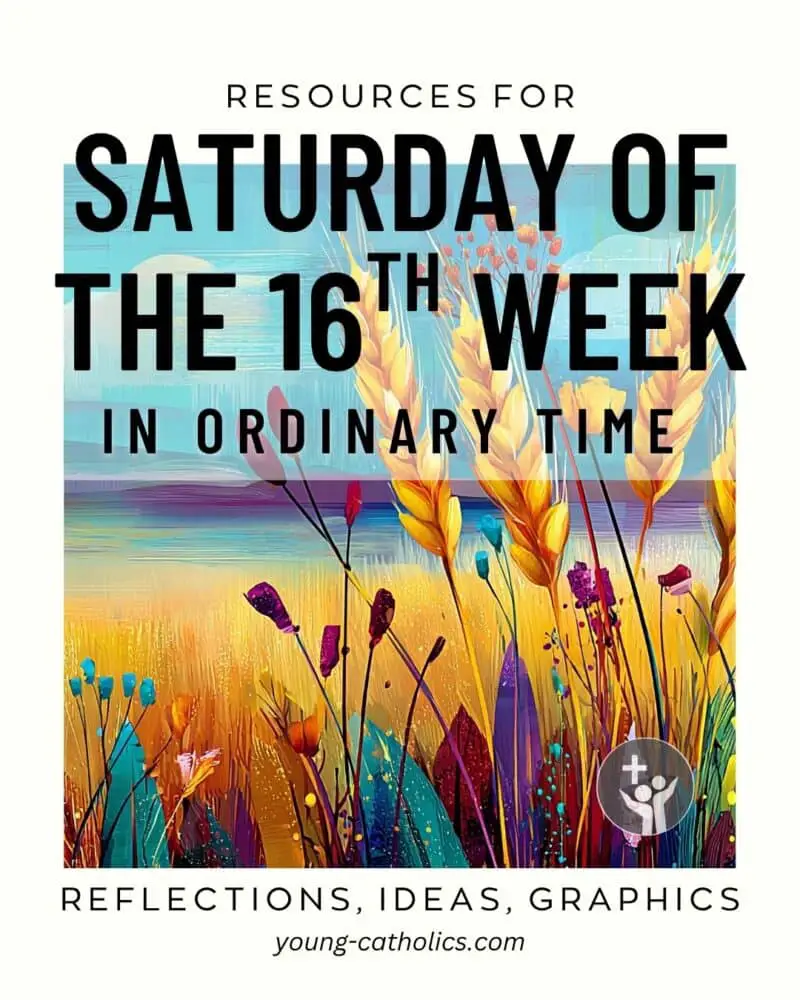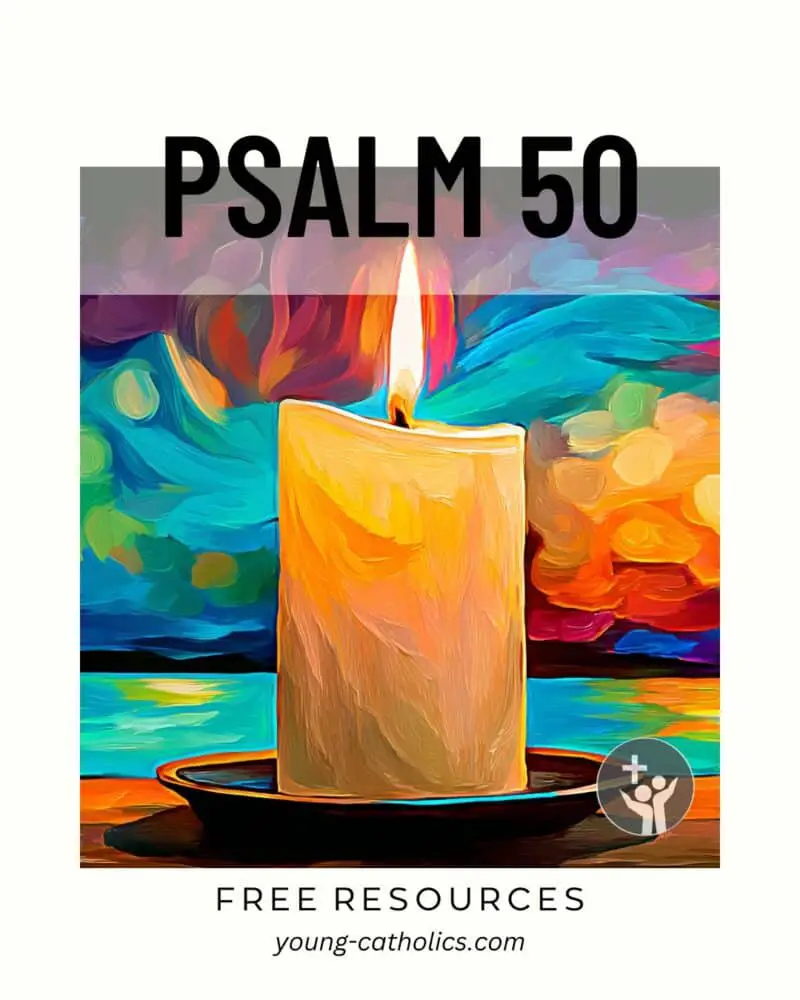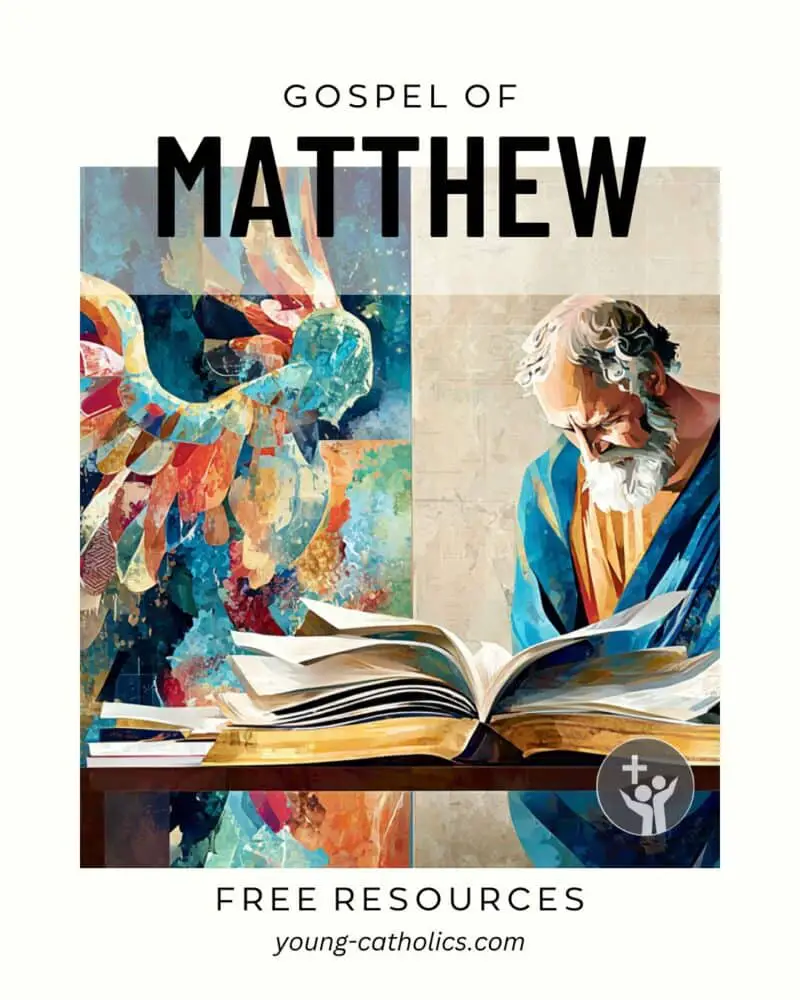Saturday of the 16th Week in Ordinary Time
Saturday July 26, 2025

Faith and God’s Promise
Saturday of the 16th Week in Ordinary Time Cycle 1 reminds us of God’s love and care for His people. The readings show how God makes promises and keeps them. They also show how we are called to trust Him and live in His ways. Each passage helps us think about our own faith and how we follow God each day.
Moses and the people of Israel agreed to follow God’s commands. They promised to obey, and the covenant was sealed with blood. This was a sign of their special relationship with God. It was also a sign of hope for the future, as God would guide them and care for them.
The psalm speaks of true worship. God does not just want empty sacrifices. He wants praise, thanksgiving, and trust. He promises to help those who call to Him in times of trouble.
The gospel tells a story about wheat and weeds growing together. It shows that God is patient. Good and evil will grow side by side for now, but in the end, God will make all things right. This gives us hope as we wait for His Kingdom to come.
Daily Mass Readings for Saturday of the 16th Week in Ordinary Time Cycle 1
- First Reading – Exodus 24:3-8: Moses conveyed God’s commands, and the people pledged obedience. He built an altar, offered sacrifices, and read the covenant. The people reaffirmed their commitment, and Moses sealed it with the blood of the covenant.
- Responsorial Psalm – Psalm 50: God calls the earth to witness His justice. He asks for sincere praise and promises rescue to those who call on Him in distress, keeping His faithful under His care.
- Gospel – Matthew 13:24-30: Jesus explains that the Kingdom of heaven is like a man who lets wheat and weeds grow together until harvest, ensuring the wheat is not harmed while the weeds are eventually destroyed.
Cycle 1 is used in odd numbered years and Cycle 2 is used in even numbered years. The gospel is the same for both years. For even numbered years see Saturday of the 16th Week in Ordinary Time Cycle 2.
If you pull up the weeds you might uproot the wheat along with them.
Matthew 13:29
Themes for the Readings for Saturday of the 16th Week in Ordinary Time Cycle 1
On Saturday of the 16th Week in Ordinary Time Cycle 1, we reflect on God’s covenant with His people and Jesus’ parable about wheat and weeds. These readings teach us about faithfulness, judgment, and God’s plan.
- Obedience to God: The people promised to follow God’s commands. This shows their commitment to live by His laws.
- Covenant Relationship: Moses built an altar and offered sacrifices. This symbolizes the deep bond between God and His people.
- Sacrifice and Worship: Moses’ offerings represent giving to God. Worship involves sacrifice and dedication.
- Patience and Growth: Jesus’ parable speaks about letting wheat and weeds grow together. This teaches patience as God’s plan unfolds.
- Good and Evil: The wheat represents good, and the weeds represent evil. Both exist until God’s final judgment.
- Final Judgment: The harvest time in Jesus’ story symbolizes the end times. God will separate the good from the bad.
Reflecting on these themes helps us understand our faith better. We learn about God’s expectations and His ultimate plan for humanity.
Reflection for Saturday of the 16th Week in Ordinary Time Cycle 1
On Saturday of the 16th Week in Ordinary Time Cycle 1, the readings help us understand important aspects of our faith. They guide us in obedience, patience, and understanding God’s plan for judgment. Let us reflect on these themes to grow closer to God.
Obedience to God
Moses shares God’s commands with the people, and they promise to obey. This moment shows their commitment to live by God’s laws. It reminds us that following God’s will is key to our relationship with Him.
Obedience to God is not always easy. The people of Israel faced many challenges but chose to stay faithful. We are also called to trust in God’s wisdom and follow His guidance in our lives.
When we obey God, we show our love and trust in Him. It strengthens our faith and helps us grow closer to Him. Our commitment to God’s commands brings peace and purpose to our lives.
Patience and Growth
Jesus’ parable about wheat and weeds teaches us about patience. The farmer allows both to grow together until the harvest. This shows that we must wait for God’s timing in dealing with good and evil.
In our lives, we encounter both good and bad situations. Sometimes we want immediate solutions, but God’s plan requires patience. He knows the right time to act and make things right.
Trusting in God’s timing helps us grow in faith. We learn to be patient and rely on His wisdom. This patience is important as we navigate the challenges of life, knowing God is always in control.
Final Judgment
Jesus’ parable also teaches about the final judgment. At harvest time, the wheat is gathered, and the weeds are burned. This shows that God will separate the good from the bad in the end.
We live in a world where good and evil coexist. It can be confusing and challenging. But we must remember that God sees everything and will judge fairly.
The promise of final judgment gives us hope. We know that God’s justice will prevail. We must strive to live good lives and trust in His plan for the future.
The readings for Saturday of the 16th Week in Ordinary Time Cycle 1 teach us about obedience, patience, and God’s final judgment. These lessons help us understand our faith better. Let us take these teachings to heart and grow closer to God.
Prayer
Lord, help us to obey Your commands, be patient in all things, and trust in Your final judgment. Guide us to live good lives and stay faithful to You. Amen.
Reflection Questions
- How can you better commit to following God’s commands in your daily life?
- In what ways can you practice patience while waiting for God’s timing?
- How do you find peace in knowing that God will judge fairly in the end?
- What challenges do you face in staying faithful and trusting in God’s plan?
Homilies and Commentaries for Saturday of the 16th Week in Ordinary Time Cycle 1
Keep Up the Good Work
The reflection for Saturday of the 16th Week in Ordinary Time Cycle 1 focuses on Jesus’ parable of the wheat and weeds. A man sowed good seed, but an enemy planted weeds among it. Instead of pulling them up, the man chose to let both grow until harvest to avoid harming the wheat. This reminds us that evil and good often exist together, but God will sort everything out in His time. Our role is to focus on the good and allow it to grow strong.
Matthew Kelly encourages us not to waste energy on people or things that try to undermine our good work. Like the wheat in the parable, we should keep growing and stay focused on doing what is right. God will handle the rest in His way and in His time. The message is simple: keep up the good work and do not be distracted by negativity around you.
Understanding the Complexity of Evil
From Bishop Robert Barron for Saturday of the 16th Week in Ordinary Time Cycle 1. The parable of the wheat and the weeds illustrates the coexistence of good and evil in the world. Evil is like a parasite, always dependent on the good it seeks to weaken.
Classical theology describes evil as a privation of the good, and this intertwining of good and evil makes it challenging to remove evil without harming the good. It is crucial to address certain obvious evils promptly and decisively. However, for other evils that are deeply embedded and intertwined with the good, a crusading approach may cause more damage. Instead, a cautious and discerning approach is necessary to deal with complex moral challenges.
We Are All Sinners
Sr. Marianne Watts, a Dominican Sister of Hope, reflects on the parable of the wheat and weeds for Saturday of the 16th Week in Ordinary Time Cycle 1. She reminds us that Jesus was not only talking about plants but about people. Many of us see ourselves as wheat, harmed by the weeds around us. But she asks us to think about how we might sometimes be the weeds in someone else’s life. We are all sinners, and our flaws affect others too.
She points out that the parable calls for patience. The householder tells the workers to let the wheat and weeds grow together until harvest. Sr. Marianne says this is a call to live with others, even those we disagree with. Life depends on sharing it with everyone, not just those who think like us. We are meant to live together, even in our sins, and make room for all.
Resources

The Book of Exodus: Sealed in Covenant
In Exodus, God forms His people through covenant. This passage shows Israel publicly accepting God’s law, which is central to the book’s message of God shaping a holy nation. The altar and sacrifices show the seriousness of this relationship. On Saturday of the 16th Week in Ordinary Time Cycle 1, we see Israel choosing obedience, which is key to their identity as God’s chosen people.
The blood of the covenant connects to Exodus’ theme of redemption. Just as the blood of the Passover lamb marked their freedom, this blood seals their bond with God. Exodus highlights God’s saving work and the people’s response. This covenant points forward to deeper promises fulfilled later in salvation history.

Psalm 50: True Worship and Justice
Psalm 50 speaks of God as judge, reminding His people that real worship comes from sincere hearts. On Saturday of the 16th Week in Ordinary Time Cycle 1, it fits the call to live the covenant faithfully. The psalm ties to the larger theme of God desiring hearts that honor Him, not empty rituals.
The psalm also stresses God’s care for the faithful. He promises rescue for those who call on Him with trust. This shows the theme of covenant love and justice in the psalms. God does not reject sacrifice but wants it joined with thanksgiving and righteousness.

The Gospel of Matthew: Wheat Among Weeds
The Gospel of Matthew often teaches about the Kingdom of heaven through parables. This reading shows the patience of God, allowing good and evil to exist together until judgment. On Saturday of the 16th Week in Ordinary Time Cycle 1, it reminds us that the Kingdom grows quietly but surely, even in a world filled with sin.
The parable fits Matthew’s larger theme of discipleship and hope. Followers of Jesus must remain faithful and not lose heart when evil seems strong. God’s justice will come at the right time. This parable assures believers that righteousness will endure and be gathered into God’s Kingdom at the final harvest.
Social Media Graphics and Bulletin Art
Wheat and Weeds in God’s Care

Bring the message of Saturday of the 16th Week in Ordinary Time Cycle 1 to life with this vibrant image. Perfect for parish bulletins, newsletters, or teaching materials, it reflects the gospel theme of patience and hope as wheat and weeds grow together. Download it to share the beauty of God’s promise with your community.
Paid subscribers may download this digital artwork (without watermarks) free of charge by clicking here. You must be logged in as a paid subscriber to access the file.
Only current paid subscribers have the rights to use the artwork.
Questions and Answers for Saturday of the 16th Week in Ordinary Time Cycle 1
Why did Moses use blood to seal the covenant in the first reading for Saturday of the 16th Week in Ordinary Time Cycle 1?
Blood was used to show the seriousness of the agreement. It symbolized life and commitment between God and the people.
What is the main message of the first reading from Exodus 24:3-8?
The main message is about the covenant between God and the people of Israel. They promise to obey God’s commands, and Moses seals this promise with the blood of sacrifices.
What can we learn from the people’s response to God’s commands in Exodus 24:3-8?
We learn about the importance of obedience to God. Like the people of Israel, we should commit to following God’s guidance in our lives.
What does Jesus’ parable about wheat and weeds mean in the Gospel for Saturday of the 16th Week in Ordinary Time Cycle 1?
The parable means that good and bad exist together in the world. God allows both to grow until the final judgment when He will separate the good from the bad.
How should we apply the parable of the wheat and weeds to our lives?
We should be patient and trust in God’s timing. We must strive to do good and leave the final judgment to God.
Why doesn’t God remove the weeds right away?
God waits to avoid harming the wheat. This shows His patience and care for all His creation.
What does the final judgment in Jesus’ parable teach us?
The final judgment teaches us that God will eventually make things right. Good will be rewarded, and evil will be punished.
How can we prepare for the final judgment?
We can prepare by living good lives, obeying God’s commands, and trusting in His plan. Our actions should reflect our faith and commitment to God.
How does the first reading relate to the Gospel reading for Saturday of the 16th Week in Ordinary Time Cycle 1?
Both readings focus on commitment and judgment. The first reading shows the people’s commitment to God, while the Gospel explains God’s judgment in the end.
What is the key takeaway from Saturday of the 16th Week in Ordinary Time Cycle 1?
The key takeaway is to obey God, be patient, and trust in His final judgment. These readings remind us of the importance of faithfulness and God’s ultimate plan for justice.
Promises Made and the Patience of God
In the first reading from Exodus, Moses shares God’s commands with the people of Israel. They respond by agreeing to follow everything God has said. Moses seals this agreement with a sacrifice. The blood of the sacrifice is sprinkled on the altar and on the people, symbolizing the bond between them and God. This covenant reminds us of the promises we make to God and His faithfulness to us.
The Gospel from Matthew tells the parable of the weeds and the wheat. Jesus explains that good and bad grow together in the world. The farmer waits until the harvest to separate them. This teaches us that judgment is not ours to make. God sees everything, and He will make things right at the right time.
These readings invite us to trust God’s timing. They encourage us to stay faithful and patient, even when we see challenges or evil around us.
Your Turn
Think about your promises to God. Are you living them out? Reflect on the parable of the weeds and the wheat. How do you trust God when things seem unfair?
Share your thoughts in the comments. Let’s encourage each other to stay faithful and patient as we walk together in faith.

Leave a Reply